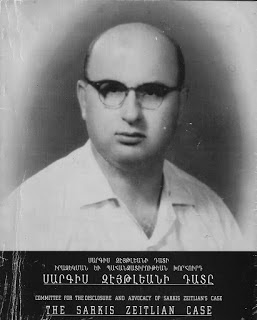By Matheos Eblighatian
Translated by Vahe H. Apelian
Edited by Jack Chelebian, M.D.
When Zohrab finally understood that his (engineering) post in Trabizond was not to be, he became exceedingly angry. No one understood that he was cut from a different cloth. He was not the type to sit in an office smoking and sipping coffee all day long doing little. The very next day he tended his resignation from the job offered to him refusing henceforth to be an employee of the state. He returned to his alma mater and registered in its law division subjecting himself to another four years of bread and halva diet.
There also he faced an unexpected development. The engineering and law divisions of the Galatasaray Lycee’ were canceled. A law school opened in Istanbul (at that time the word and the institution of the university did not exist and the faculties were called the medical school, law school). The government had assigned a very strict person of Hungarian descent named Magar Emin Effendi as its director.
The ensuing years were difficult for Zohrab as he anxiously waited for his graduation to practice law whose calling he felt. Here again, his intense desire to become a lawyer met with unexpected difficulties. First, the number of years for studying law was increased from three to four years. More importantly, he got into an argument with the director of the law school and had to leave the school without taking its final examinations.
During that time an enlightened minister by the name Hassan Fehmi Pasha initiated a European based judicial structure. He started the reformation from the province of Edirne, where he appointed his friend Toros Sarajian as the general prosecutor. He also wanted to change the caliber of the lawyers who were practicing law in the courts. They were asked to pass the legal examination to qualify for practicing law. In Istanbul, the examination took place in the Law School. In the provinces, a committee composed of the principal of the central court and a few other members conducted the examinations. Those who passed the examination in a particular province could only practice there.
Zohrab hurried to Edirne where he passed the examination with flying colors. He returned to Istanbul whereby with a special dispensation he also secured the right to practice law there as well. Thus, the graduate from the engineering school who had left that career embarked in the practice of law in a non-conventional way.
*****
I do not have much to say about Krikor Zohrab as an author and publicist. To do so, one needs expertise in the field and a thorough knowledge of the person’s literary output. I lack the former and I do not have sufficient time for the latter. I know that he started writing at an early age and became a well-liked author and that his writings helped him tremendously in his career as a lawyer and as a community leader. He had mastered the language and had a beautiful style of writing, which I assume was nurtured in the Armenian elementary school he attended. Furthermore, his literary collaboration with H. Asadour surely was beneficial to him. His superb intellect, cultured mind; his capacity for astute observation and sound judgment were more than enough to have catapulted him to social prominence.
By 1880’s Zohrab had already received a sound secondary education in French and subsequently completed his engineering and law courses. Consequently, he had received the best education in his time. Add to that his innate abilities to observe, analyze, judge, articulate and to write, you can picture a multi-talented accomplished person. There may have been others who may have surpassed him in a given trait or another but not in the sum total of these characteristics. No other Armenian came close to his stature.
It was his youthful energy and desire to be known and advance his career that motivated his literary endeavors. It would have been wonderful if he had devoted himself completely to literature. However, he had his passions and a thirst for the pleasures of life that could only be attained by material rewards. In those days achieving material comfort through literature was impossible. The Armenian readership was small and making a comfortable living as an author was almost an impossible dream, a ‘paper glory”.
Instead of studying legal cases and preparing for superb defensive arguments, had he devoted to literature, the Armenian literature would have been much richer. However, his contribution to Armenian literature is such that he is regarded among the most famous Armenian writers. As a publicist, he penned valuable editorials with tight logic. I still remember his column titled (St. Gregory) “The Illuminator’s Broom”, which was reprinted at least a couple times per year by various publications.









